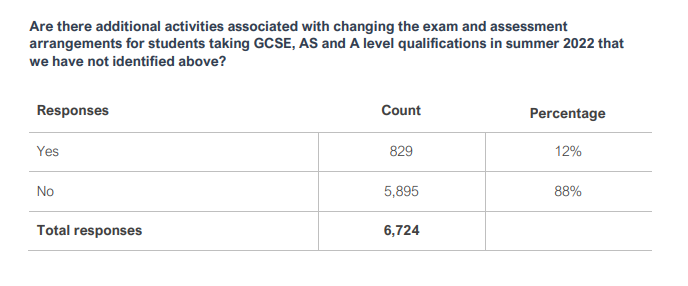The
 blog
blog
Exams 2022 - have your say
12th October 2021 | Sarah CullWhat are the Government's contingency plans if Summer Exams 2022 can’t go ahead and how can you have your say?
In any normal year, October for me would be assessing how far my GCSE and A-Level groups could feasibly get before mock exams in late November and starting to frame how we would move from there to the summer exams. This was all penciled in loosely at the start of every year but changed for groups with different personalities and pace.
The top set GCSE group that sprint through the syllabus, the Year 13 group that have spent half the lessons missing on University open days and consequently we’re 2 weeks behind etc.
The past 19 months have been anything but normal and so our approach to planning has had to change continuously. The initial thrill that my GCSE students experienced in March 2020 when the exam cancellation was announced was rapidly replaced with uncertainty and then later with a range of anxiety to apathy, depending on the level they had been working at.
Some students happily switched off, relieved that they wouldn’t be expected to revise and resigned themselves to whatever grade we selected. Others continued to work and email and ask for help, keen to prepare for A-level courses and futures they had been working towards.
Many of us naively presumed this was a one off event. We were wrong.
Summer 2021, the year of Teacher Assessed Grades (TAGS - for those acronym ophiles) brought its own flavour of chaos, overwork and inconsistency.
I spoke to students who were being tested weekly on topics beyond what they had been taught, students with a rotation of substitute teachers due to COVID, unsure on who was making the judgements for them. Students being given grades and opportunities to ‘stick or twist’ and take more optional tests and students who didn’t seem to have any idea how well they were doing in anything.
(Of course I also spoke to students who seemed perfectly content and confident that their work and test results reflected the grade they hoped for and planned for and were assured of their futures, but they don’t make for dramatic blog posts).
Currently, the COVID situation is looking up, by which I mean we have a vaccination program and cases and deaths seem to be stabilising.
On 30th September the decision on exam arrangements was released, hinting at the optimistic possibility of exams actually happening.
So what are the 2022 arrangements if exams do go ahead?
To summarise the main points of the changes:
- Optional topics and content in GCSE English literature, history, ancient history and geography
- Students taking GCSE, AS and A level art and design will be assessed on their portfolio only.
- Exam boards will provide advanced information about the focus of the content of the exams for all GCSE, AS and A level subjects (except GCSE English literature, history, ancient history and geography).
- This advance information will be provided by 7th February 2022 at the latest. (It remains to be seen how specific this advance information will be).
- Students will be given a formulae sheet for GCSE mathematics and a revised equation sheet for GCSE physics and combined science, covering all the equations required in the subject content. (A year without the amazing sing along formulae youtube videos?? Perish the thought!)
How do people feel about these changes?

In the consultation process the proposed changes were positively received and 88% thought that there were no other activities that hadn’t been identified.
Many respondents emphasised the need for changes to be communicated as early as possible and new materials to be provided with enough time for students to become familiar with them.
Ok so far so good, what are they still consulting on?
Well regardless of your view on the current situation, there is no guarantee of what we will be facing in Summer 2022.
The current consultation is on contingency plans for the exams should they be cancelled again. The consultation is open until 13th October 11.45pm so once you’ve had a read, go and have your say!
The suggestions and feedback people gave on the last consultation was significant in the decisions being confirmed and made for thought provoking reading in the aftermath.
Why are contingency plans necessary?
Coming up with Teacher Assessed Grades has been stressful, inconsistent and at times divisive - just overall not very fun. (Ok so I don’t think the new plan will make it fun exactly)
The aim of the contingency plans is to:
- Help teachers to decide what evidence should be used to inform a TAG, if that was needed
- Reduce teacher workload (we can all get on board with this one!)
- Reduce student anxiety and the risk of over-assessment
- Increase consistency between centres in the way students are assessed
All fairly noble sounding intentions!
What are the current proposals?
In the event of exam cancellation the government is proposing the following:
NEAs (Non-Examination Assessment - coursework)
- Centres should aim to complete the assessment in line with arrangements announced by Ofqual for 2022 and the timescales set by exam boards.
- For art and design qualifications and Project qualifications not assessed by exams, TAGs would be determined by an assessment of the portfolio or project.
(The requirement for art and design students to also complete an exam board-set task for summer 2022 has already been set aside).
TAGs
- Teachers must not determine a TAG unless exams are cancelled nor tell their students what their TAG might be.
This is the first and most important point. Be prepared for the eventuality and collect the evidence but don’t determine a TAG or communicate it to students.
- Centres should plan assessment opportunities for TAGs in advance, to a timetable that secures some evidence early in the academic year (for example, before Christmas)
- ‘A sensible pattern’ (their words not mine) could be to plan to assess students once in each of the second half of the autumn term, the spring term, and the first half of the summer term. T
They emphasise that this should cover as much of the specification as possible but avoid over assessment, ideally use past exam papers but without including content that hasn’t been taught. Assessments should utilise exam conditions but not significantly exceed the total exam time. Simple...if only we’d thought of this years ago. (I’m mentally sarcastically raising one eyebrow)
- Students should be informed clearly of assessments that would contribute to their TAG should one be required and all of these should be taken into account (no cherry picking the highest marks) and students should receive feedback but not be given a TAG grade and one should not be determined unless required.
- If disruption makes these assessments unviable, the disruption should be recorded and alternative evidence used to determine a TAG.
So how best to prepare?
- Firstly, give feedback on the consultation before 13th October.
They invite views on:
- The type, volume and timing of the production of the evidence used to inform TAGs
- The support given by the exam boards to teachers determining TAGs
- Quality assurance within schools and colleges (internal quality assurance) and undertaken by the exam boards (external quality assurance)
- Look out for the decisions of the consultation to be released
- Start to think about planning assessment opportunities for TAGs before Christmas.
- Record assessment results in Vizi under the type ‘TAG assessment’ to see up to date information on your students’ average grades.
- Wear a mask, take regular lateral flow tests, maintain social distancing and try your best to reduce the spread of COVID so that exams can go ahead as planned.
Giving feedback on the consultation is time consuming but if you have something you feel passionately about, taking the time to make a contribution could potentially make a difference to the outcomes for your students or children in the event of exam cancellation so it’s worth doing. Grab a cup of tea and a digestive (or whatever floats your culinary boat) and have your say!
Other articles you may be interested in
25th November 2021 10 mins
Blog post
4th November 2021 10 mins
Blog post
The ECT guide to registration codes
Read more15th January 2020 10 mins
Blog post
Data driven schools
Read more3rd December 2019 10 mins
Blog post
Peer to peer grading
Read more7th June 2019 10 mins
Blog post
Encouraging marking standardisation
Read more2nd August 2018 10 mins
How to
Using assessment breakdowns
Read more3rd February 2018 5 mins
Blog post
Time to get my head around the 1-9 grading system
Read more1st November 2017 5 mins
Blog post
6 steps to follow to create a good data environment for your school
Read more25th August 2017 10 mins
Blog post
What makes a good viz? - Part 2
Read more20th July 2017 10 mins
Blog post